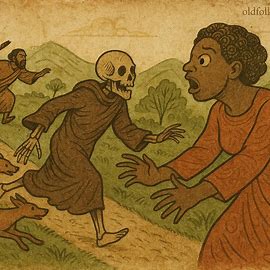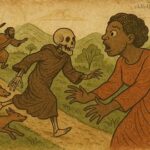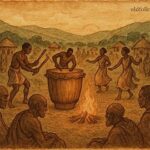Long ago, before Burundi was the land we know today, the ancestors of the Bantu people set forth on a journey that would shape not only their destiny but the very heart of their cultural identity. They were not wanderers without purpose but a people bound together by blood, faith, and a vision of a homeland where they could grow, thrive, and preserve their traditions. Guided by a divine force, they left their ancestral regions of West Africa and began the long, treacherous migration that would lead them into the hills, rivers, and valleys of Burundi.
The journey was not simple, nor was it swift. For the Bantu ancestors, every step carried the weight of uncertainty, yet also the spark of hope. They traveled across lands that tested their endurance, arid plains that burned under the sun, dense forests thick with shadows, and rivers whose currents threatened to sweep away the weak. At each trial, the divine presence urged them forward, a reminder that their suffering was not in vain but part of a greater plan.
As they pressed on, hunger and thirst stalked them. Families huddled together under the stars, children clung to their mothers, and elders whispered prayers for strength. Yet through all of this, unity was their shield. No one was left behind. The strong lifted the weak; the young carried the burdens of the old. When storms raged, they built shelters together; when hunger gnawed, they shared the last morsels of food. Each hardship became a lesson, shaping their resilience and binding them closer as a people.
The Trials of the Migration
The most dangerous challenges were not always seen but felt deeply within the spirit. Fear of the unknown pressed upon them as heavily as their physical exhaustion. They did not know what awaited them beyond the horizon. But with every sunrise, they rose again, encouraged by the belief that their journey was guided by divine will.
The myth tells us that even when despair threatened to break their resolve, the ancestors looked to one another for strength. A mother comforting her child, a leader raising his voice in encouragement, a group of elders recounting old stories, all were reminders that their identity lay not in land but in community. And this community was determined to find a home where their roots could grow deep.
READ THIS: The Tale of the Mysterious Lake Tanganyika: A Burundian Folktale
After years of trials, the ancestors finally reached the green hills and fertile valleys of Burundi. Here, rivers flowed with life, the soil was rich for planting, and the land offered a promise of stability. They knew their journey had not been in vain. The land became their new home, a place where they could build villages, raise families, and honor the sacrifices made during their migration.
The Legacy of Unity and Resilience
In time, the story of the Bantu migration became more than history, it became legend. It was told and retold at village gatherings, festivals, and firesides. The tale reminded the people that their very existence in Burundi was the result of resilience, unity, and divine guidance. The ancestors had carved out a future not just for themselves but for every generation to come.
For the Burundian people, the Legend of Bantu Origins is not merely a tale of the past but a living foundation of identity. It teaches that hardship can be overcome through collective strength and that faith in divine providence can illuminate the darkest path. More importantly, it preserves the truth that their community was born not from ease but from sacrifice and endurance.
Moral Lesson
The Legend of Bantu Origins carries a powerful moral: unity and resilience are the strongest tools for survival. Hardship will always come, whether in the form of hunger, uncertainty, or fear. Yet, just as the Bantu ancestors endured, so too can communities today overcome challenges when they remain united, share their burdens, and trust in something greater than themselves.
In a world that often celebrates individual triumph, this legend reminds us that true strength lies in collective endurance. A people bound by shared purpose can cross deserts, climb mountains, and endure storms to build a home where hope flourishes.
Knowledge Check
Who are the central figures in the Legend of Bantu Origins?
The ancestors of the Bantu people, guided by divine force.
What challenges did the Bantu ancestors face during their migration?
Harsh terrains, hunger, thirst, fear, and exhaustion.
What role did unity play in the legend?
Unity ensured survival, as the strong supported the weak and no one was abandoned.
Why is the legend important to Burundian identity?
It preserves cultural history, teaches resilience, and emphasizes shared heritage.
How is the Legend of Bantu Origins passed down through generations?
Through oral tradition at gatherings, festivals, and storytelling sessions.
What is the main moral lesson of the legend?
That resilience, unity, and faith can overcome even the greatest hardships.
Source: Burundian folktale






